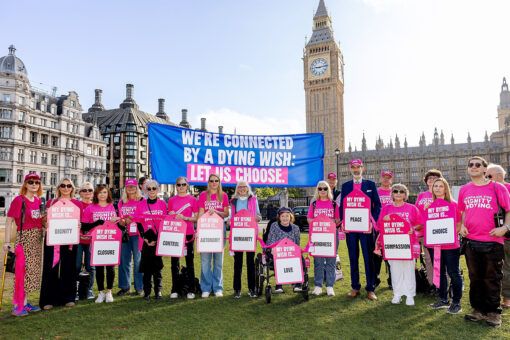Dying people and bereaved relatives join experts in urging Peers to put autonomy at the heart of Assisted Dying Bill and hear lived experience evidence

Key points from Day One:
- Peers heard from Lord Falconer, Kim Leadbeater MP, and representatives of the Royal Colleges of Nursing (RCN), General Practitioners (RCGP) and Physicians (RCP).
- Overseas experts’ experience, cited by parliamentary witnesses, reaffirmed that safeguards and compassion can coexist. Several Select Committee members echoed calls to hear from overseas clinicians with direct experience of assisted dying provision.
- “Separate service” proposal called for by the RCGP already exists in Bill through opt-in protections welcomed by the BMA.
- Bill continues to receive unprecedented levels of scrutiny, having now received 120 hours of debate in the Commons and the Lords.
Key points from Day Two:
- Peers heard from representatives from the Royal College of Psychiatrists, the British Association of Social Workers, the Royal College of Pathologists, NHS England, and the former Chief Coroner of England and Wales.
- Dr Annabel Price (Royal College of Psychiatrists, which is officially neutral on the principle of law change) confirmed that around half of the psychiatrists they represent would support introducing assisted dying for terminally ill people. Select Committee members raised that a number of psychiatrists have expressed their concern that the College did not consult with its membership before issuing its position on the Bill.
- Dr Luke Geoghegan of the British Association of Social Workers, whom Select Committee member Lord Winston highlighted is also a vicar, told the Committee that safeguarding must recognise coercion can operate in both directions – including families pressuring loved ones out of their wish for assisted dying. Lord Winston also asked whether, in a pluralistic society, it is right to impose religious views through legislation. Dr Luke Geoghegan replied that it is not “we don’t have the right to impose views.”
As the House of Lords Select Committee – whose membership includes a majority of opponents to assisted dying, including the Bishop of Newcastle – wrapped up its first week, Peers were urged to heed patient autonomy and hear from the voices of the terminally ill.
Day one saw a call for Peers to put patient autonomy at the core of the Bill, with Professor Nicola Ranger, General Secretary and Chief Executive of the RCN saying “When we get it wrong in healthcare, it’s usually because we’re being paternalistic. And it’s really important, whatever safeguards are there, whatever process, whatever system is there, the underlying basis has got to be autonomy of individuals and patients as a bedrock.”
The Committee’s session yesterday explored the potential role of coroners and medical examiners in the Bill. While some witnesses suggested all assisted deaths should automatically trigger a full inquest, several Select Committee members argued that this risks prolonging the distress loved ones already experience under the current law and would be unnecessary given the extensive scrutiny each assisted dying request would be subject to before a death has occurred, offering far greater protection than a posthumous investigation.
Furthermore, there is nothing in the Bill to prevent an assisted death being referred to the coroner for full investigation if there were any concerns.
Louise Shackleton, a trained safeguarding social worker who accompanied her husband Antony, who suffered from terminal motor neurone disease, to Dignitas in December 2024 and later endured a ten-month police investigation, said:
“When a death has been so expected, explored, planned and documented in advance, there should be no need to automatically put families through an investigation or inquest for weeks or months afterwards. It just perpetuates the system we already have – one that’s failing patients and families alike.”
She added: “Terminally ill people face two fears – the fear of their life being cut short by disease, and the fear of what their death will look like. Watching this week’s hearings, it’s clear professionals already have the skills and principles to make this process safe and compassionate.”
Nat Dye, who is terminally ill with bowel cancer and attended Wednesday’s hearing, added: “I’m preparing for my own death without the peace of mind that an assisted death would bring. Sometimes even the highest dose of morphine doesn’t touch the pain. I fear what might be coming in my immediate future, and I can do absolutely nothing about it.”
Sarah Wootton, Chief Executive of Dignity in Dying commented on the first week of Select Committee:
“People like Nat are exactly who this Committee should also be listening to – those living with the fear and pain that this Bill could ease. As Kim Leadbeater raised in her evidence on Wednesday, for an inquiry into the Terminally Ill Adults Bill not to hear from terminally ill adults is surely not right or fair. It’s also a missed opportunity not to draw on the wealth of overseas experience from those directly involved in delivering, designing, and training for assisted dying services – evidence that could help ensure safe, compassionate and workable legislation here in the UK.
“While discussion has rightly moved on to the detail of how this law can be safely and effectively delivered, too often, objections already debated at length for over 120 hours and addressed by amendments to the Bill, are dominating. The Bill provides rigorous oversight, documentation, and review while the person is still alive and where there currently is none. True safety lies in respecting patient autonomy and ensuring safeguards that protect people when they most need it – before death, not after.”
ENDS
*For more information and general media requests, please email Media & Campaigns Officer, Tom Steen at tom.steen@dignityindying.org.uk or call 07356135578*